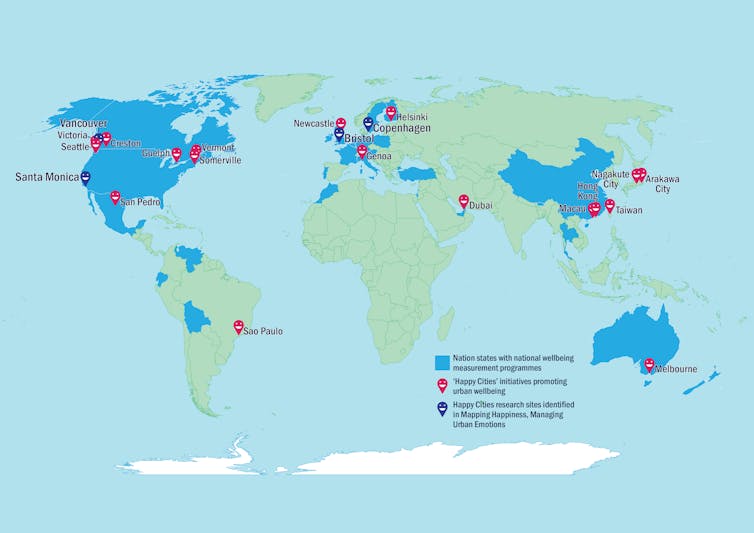Happiness is the metric of the future – but there are problems with how we measure it
Jessica Pykett, University of Birmingham
Move over GDP: happiness is angling to become the metric of the future. Nation states have begun to compete in global happiness rankings and plan policy according to statistics of well-being.
Most recently, New Zealand announced that its 2019 budget will report on how national spending impacts on well-being. City authorities are developing “smart” approaches to measuring happiness, mobilising an ever-increasing array of mobile apps and behavioural data that aim to sense, map and explain our daily happiness. For example, the Smart Dubai Office launched their Smart Happiness Index earlier in 2018, which promises to assess the performance of their city managers based on happiness gain per funds spent.
This emphasis comes off the back of the academic field of happiness studies, which has emerged as a credible science – with its own research centres and academic journals – since the turn of the 21st century. A simple Google Scholar search for happiness scholarship published in 2018 will pull up an astonishing 23,000 hits.
The field’s leading scholars originally set out to bring together diverse insights from philosophy, psychology, sociology, health perspectives, economics, cultural studies and the arts, to rigorously investigate how satisfied people feel about their life and how they assess their own subjective well-being. Psychologists, in particular, were fed up of focusing on distress and disorder, and launched the associated field of positive psychology at this time.
Measuring a smile
The idea that happiness can be measured and mapped, and that it varies geographically, is now established. Every three years since 2012, a World Happiness Report releases eagerly awaited global rankings of happiness. These are based on a global survey that asks people to evaluate how they feel about their life on a scale from zero to ten. The rankings are usually dominated by the Nordic countries, with Finland currently topping the list.

While people might generally feel that their happiness is something intangible which cannot be given a number, this new measurement approach is increasingly popular among governments who want to move beyond economic growth as a measure of a nation’s value and progress. Meanwhile, a global movement for transforming current economic models to one based on well-being is gathering support.
It’s true that we now know a substantial amount about happiness, including who is happiest and where, social patterns in happiness according to your age and gender, and what drives individual and national levels of happiness, such as income, education, social relationships, good national governance, and health. Yet levels of global economic inequality and high rates of global depression and mental distress persist. In other words, while we know a lot more about happiness, happiness as a whole has not improved.
This is a pressing issue and should affect how national governments, cities, and local authorities go about their modern attempts to improve happiness levels. The problem is that as the field has taken off, a particular understanding of happiness has taken hold. And it is increasingly clear that this definition is limiting.

Defining happiness
Behavioural economists have been highly influential in bringing happiness studies to the public policy agenda on a world stage. But in order to measure happiness, it had to be redefined as an observable behaviour. As such, happiness, as understood by those monitoring and measuring it, is something internal, concerning the mental aspects of individual – yet as everyone knows, happiness generally relates to something outside of ourselves (we feel happy “about” something), and can be transformed by a change in our external circumstances.
Economists working in happiness studies are also increasingly interested in using neuroscientific and genetic evidence in their efforts to eliminate bias and provide objective, comparable measures. Again this involves looking inwards – this time at our biology rather than our behaviour – to define what happiness actually means.

There are serious limitations to behavioural economic and neuroscientific explanations. These approaches transform subjective well-being into an objectified measure, a target of national and global governance, by aggregating the well-being of anonymised individuals. This downplays the role of culture and context in shaping our very sense of self, our expectations, aspirations and perceptions. Alternative understandings that challenge the boundaries between inside and out, and that are central to understanding this important field, have been eclipsed.
“Culture”, then, is a sticking point for behavioural definitions of happiness. Even the idea that subjective well-being can be measured by a survey is increasingly contested by some economists, who have, for example, identified that people’s assessments of their happiness can be affected by the way in which their country’s education system grades exams – an unusual effect which challenges the validity of global happiness indexes.
Paradoxes of happiness
Further limitations are often highlighted by economists and psychologists. Namely, while we might commonly think of happiness as the opposite of depression, this does not always appear to be the case. People living with mental health problems can simultaneously report feeling happy. Some of the happiest nations, such as Finland and Denmark, also have high suicide rates, as reported in a new study, which set out to expose some of the contradictions in the Nordic dominance of global happiness league tables. Isabella Arendt, a researcher at the Danish Happiness Research Institute, told me recently how she sees happiness as a relative and dynamic term, which seems far more sensible: “Even if we lived in a Utopia, there would still be unhappy people.”
Another paradox haunts happiness studies: creating the conditions to promote well-being may, in fact, be driven by a sense of dissatisfaction and unhappiness with the status quo. Less happy people, for example, are more likely to be politically active than happy ones. Little wonder, then, that increased scientific knowledge about happiness has not yet led to significant social change.
These limitations and paradoxes need to shape the future of happiness studies and well-being policies. It seems improbable that the current “smart happy cities” movement, informed by predictive behavioural analytics, wearable emotion sensing and empathic machine learning, will provide a 21st-century technical fix to the centuries old question of what happiness is and how we might collectively pursue it. Tracking happiness is all very well, but before we use such maps to determine how we are governed, we need to understand what happens to our happiness when it becomes an emotion to be mapped, measured and managed.
Jessica Pykett, Senior Lecturer in Human Geography, University of Birmingham
This article is republished from The Conversation under a Creative Commons license.
Comments
Post a Comment